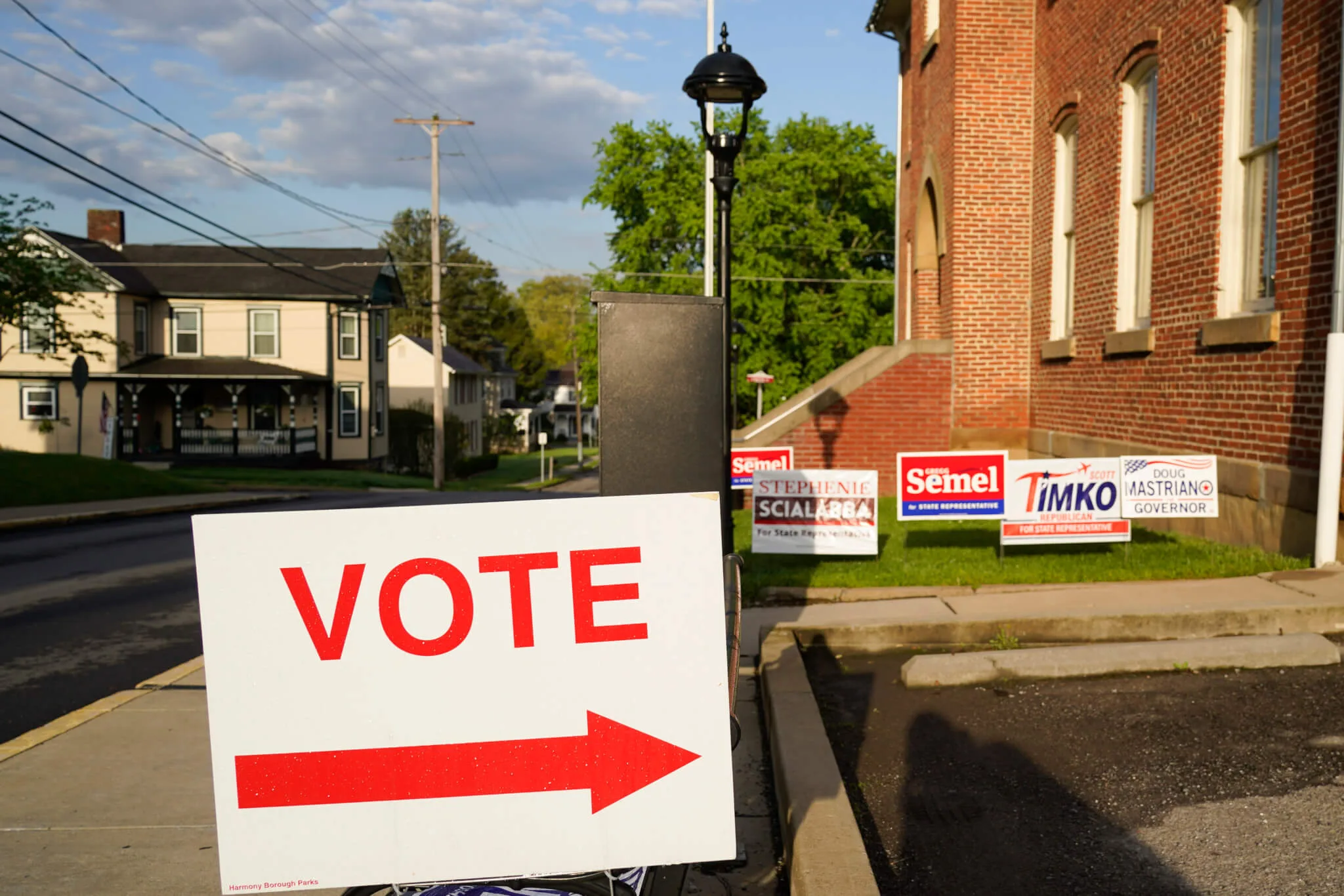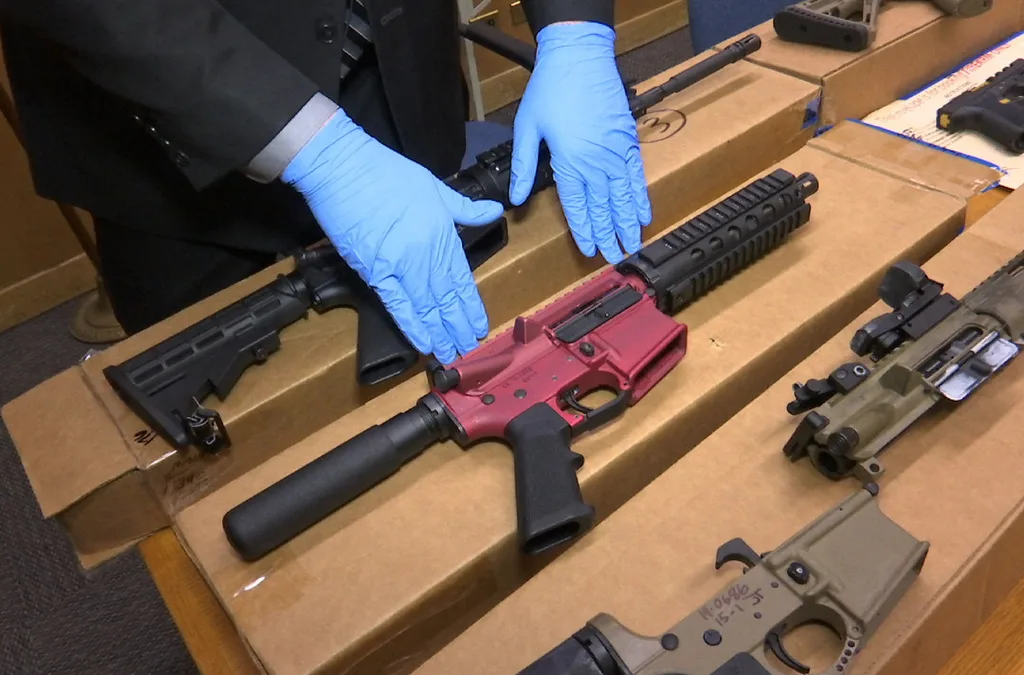
Signs point the way for voters to cast their ballots at the polling location for the Pennsylvania primary election, Tuesday, May 17, 2022, in Harmony, Pa., (AP Photo/Keith Srakocic)
Six proposed constitutional amendments about abortion rights, voting, and the balance of executive power in the state government have the potential to make it on the primary ballot in May 2023.
Amending the Pennsylvania Constitution is a long process that stretches over multiple legislative sessions. Recently, it has become the tactic of choice for state Republican lawmakers seeking to advance policies that would otherwise be vetoed by Democratic Governor Tom Wolf.
Republicans are hoping that tactic pays off as soon as May 2023, when six constitutional amendments could potentially be on the ballot for the primary election. Next year’s primary comes during an off election cycle when voter turnout is notoriously low, something that could favor Republicans.
All of the proposed amendments still need to pass both chambers (House and Senate) in another legislative session—or again in 2023—then be advertised to the public before the next election. This means that if Republicans retain control of the state legislature in November’s elections and pass the amendments a second time, they would then go before voters as separate ballot questions for the final say.
Historically, proposed amendments that go before Pennsylvania voters usually get approved. SInce 1968, only six of the 49 total referendums that have made it on the ballot were rejected.
“There are certainly occasions when we should consider amending our constitution, but this is not something to be taken lightly or done politically,” said Senate Minority Leader, Jay Costa (D-Allegheny). “This new fad of legislating by constitutional amendment dramatically reshapes Pennsylvania’s state government.”
In an attempt to speed up the cumbersome amendment process, the Republican-majority state Senate lumped five different but significant changes to the constitution into one proposal over the summer. Senate Bill 106 contains measures that could greatly affect abortion and voter rights, and the power of the governor’s office.
Another amendment that should have made it to the ballot in 2020 but didn’t due to a procedural error—resulting in the resignation of then Secretary of State Kathy Boockvar—seeks to amend the statute of limitations in cases of childhood sexual abuse.
Let’s take a closer look at the initiatives Pennsylvanians could be voting on as soon as next May:
Senate Bill 106
SB 106 was originally introduced in January 2021 by Sen. David Argall (R-Schuylkill) and contained only one proposed amendment related to the process of selecting the state’s lieutenant governor candidates. It passed the Senate by a 43-4 vote.
In December, while under consideration in the state House, GOP representatives proposed four additional amendments which were added to the bill.
The five constitutional amendments proposed in SB 106 are as follows:
Making the Lt. Governor an Appointed Position
The original amendment in SB 106 would allow a political party’s candidate for governor to choose their own lieutenant governor running mate.
Currently in Pennsylvania, candidates for governor and lieutenant governor run in separate primaries for their party’s nomination. The candidates then form a joint ticket for the November general election.
Lawmakers on both sides of the aisle say it’s a necessary change to a process that has not always yielded the best results, a reference to the tumultuous relationship between Gov. Tom Wolf and former Lt. Gov. Mike Stack.
No Right to an Abortion
This proposed amendment would change the state consitution to clarify that there is no right to an abortion or taxpayer funding of abortions in the commonwealth. Originally introduced as SB 956 by Sen. Judy Ward (R-Blair), this proposed change would be the vehicle through which legislators could enact anti-abortion laws.
Requiring Voter Identification
This proposed amendment would require voters to show identification every time they vote in the commonwealth. Currently, voters only need to show their ID when voting at a polling place for the first time.
Republican lawmakers say the amendment is needed to bolster faith in the state’s election system. Democrats have long opposed voter ID requirements, saying it could negatively impact minority and elderly voters who might lack proper identification.
Election Audits
Touted as another effort to restore faith in the election system in Pennsylvania, Sen. Ryan Aument (R-Lancaster) introduced a constitutional amendment that would allow the state Auditor General to conduct regular election audits. The proposal would prohibit the Department of State, PennDOT, and counties from withholding information necessary to conduct a full and comprehensive audit. It also requires an annual, independent audit of the Statewide Uniform Registry of Electors (SURE) system.
Voting Down Regulations
In Harrisburg, lawmakers can vote to disapprove a state regulation (such as those passed during the COVID-19 pandemic), but the governor has the power to veto it. The legislature would then need a two-thirds majority vote to override the veto.
Rep. Eric Nelson (R-Westmoreland) said the bar is too high. Nelson introduced the proposed amendment to change the process and allow lawmakers to vote down a resolution with no fear of an impending veto.
House Bill 14
HB 14 was introduced by Rep. Jim Gregory (R-Blair) in January 2021 and proposes amending the state constitution to include a two-year period for legal actions arising from childhood sexual abuse that have otherwise exceeded the statute of limitations.
The amendment was originally supposed to go before voters in 2020, but the state failed to make the required public advertisements. Republicans in the state Senate would not employ a rarely used emergency process to amend the state constitution so the proposed amendment had to be reintroduced, starting the lengthy process over again.
Politics

Biden announces tariffs on Chinese Steel while visiting United Steelworkers members
“I'm president because of you guys. I really am and I'm proud. As was mentioned earlier, I'm proud to be the most pro-union president in American...

Opinion: Is Reproductive Healthcare just a women’s issue?
In this op-ed, Pennsylvania resident Lynn Strauss discusses the Republican Party’s conflicting stance on reproductive healthcare policy and the...

2 top US gun parts makers agree to temporarily halt sales in Pennsylvania
Philadelphia filed suit against Polymer80 and JSD Supply last year, accusing the manufacturers of perpetuating gun violence by manufacturing ghost...
Local News

Conjoined twins from Berks County die at age 62
Conjoined twins Lori and George Schappell, who pursued separate careers, interests and relationships during lives that defied medical expectations,...

Railroad agrees to $600 million settlement for fiery Ohio derailment, residents fear it’s not enough
Norfolk Southern has agreed to pay $600 million in a class-action lawsuit settlement for a fiery train derailment in February 2023 in eastern Ohio,...






